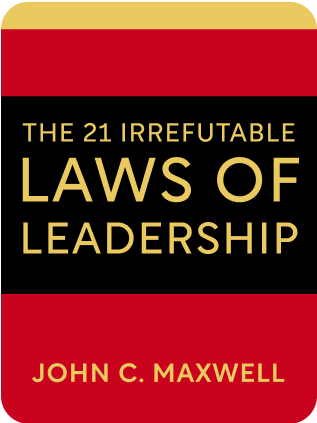

This article is an excerpt from the Shortform book guide to "The 21 Irrefutable Laws Of Leadership" by John C. Maxwell. Shortform has the world's best summaries and analyses of books you should be reading.
Like this article? Sign up for a free trial here .
Are you looking for The 21 Irrefutable Laws of Leadership quotes by John C. Maxwell? What are some of his most notable ideas about leadership?
In The 21 Irrefutable Laws of Leadership, John C. Maxwell shares what he’s learned from his lifelong study of leadership. The following quotes highlight some of his key ideas about leadership.
Continue on for The 21 Irrefutable Laws of Leadership quotes by John C. Maxwell.
The 21 Irrefutable Laws of Leadership: Quotes and Passages
“When it comes to identifying a real leader, that task can be much easier. Don’t listen to the claims of the person professing to be the leader. Don’t examine his credentials. Don’t check his title. Check his influence. The proof of leadership is found in the followers.
According to Maxwell, the true value of a leader is measured not by his/her rank or position, but by the influence they have over their followers. Followers consider several factors when choosing whether or not to follow (or be influenced by) a leader:
● Positive character traits (Law #6, leaders have good character). Some people are by nature sincere, diligent, and trustworthy. People tend to follow potential leaders who have admirable personalities.
● Personal connections. People who personally know a potential leader are more likely to follow them.
○ For example, when you start a new job, prioritize relationship-building with your coworkers and employees.
● Competence. Followers consider whether or not their potential leader is knowledgeable and has a plan for the future.
● Intuition (Law #8, leaders pay attention to intangibles). Is a potential leader aware of intangibles as well as quantifiable details? Consider things like morale, motivation, timing, and energy.
● Background. If a potential leader already has experience acting in a leadership position, followers are more likely to give them the benefit of the doubt.
● Track record. Has the potential leader successfully led projects before? ○ To get a track record, you need to take charge of projects. You can start small, by, for example, planning an event for your immediate family or a few friends.
● Capacity. Followers consider whether or not a potential leader will help them achieve their goals.
“Anyone can steer the ship, but it takes a leader to chart the course. Leaders who are good navigators are capable of taking their people just about anywhere.”
In this quote, Maxwell is talking about the Law of Navigation, which is the fourth of the 21 laws of leadership. The Law of Navigation is all about having a vision for your business and charting the path to get there. According to Maxwell, the key to successfully implementing the Law of Navigation is planning. He uses the acronym PLAN AHEAD to encapsulate the principles of this law:
- Predetermine a course of action
- Lay out your goals
- Adjust your priorities
- Notify key personnel
- Allow time for acceptance
- Head into action
- Expect problems
- Always point to the successes
- Daily review your plan
“Leaders see everything with a leadership bias.”
Here, Maxwell is talking about the Law of Intuition. This law is one of the most difficult, but everyone possesses some level of intuition. People are typically intuitive in their areas of strength (for example, a fashion designer knows how to match colors without even thinking about it). Therefore, natural leaders have a head start with this law, but everyone can work on it. Intuition comes from two things, talent and learning. Not everyone will have natural talent, but everyone who’s willing to learn can develop intuition.
Leaders who have intuition are attuned to many intangibles and can “read” the following:
● Situations. Leaders can walk into a room and sense the team chemistry and dynamics. ○ For example, when John C. Maxwell walks into the office of EQUIP, a company he owns but doesn’t often visit, he’s quickly able to fit back in. He’s able to sense people’s attitudes and ask good questions.
● Trends. While followers and managers think short-term, leaders think years and decades ahead. They can “feel” where a company is headed.
● Resources. Instead of personally doing things, leaders maximize resources, especially other people.
○ For example, when a high-performance leader encounters a problem, she doesn’t think, how can I help, or how can I solve this? She thinks, how do I reach the next level to overcome this? Who do I put on this project?
● People. Leaders can sense how people are feeling.
○ For example, leaders watch people’s faces and body language, talk to people, and read books on relationships to develop this skill.
● Themselves. Leaders are aware of their current state of mind, strengths, and weaknesses.
Leadership often calls on you to make a decision before you have all the information. What you don’t know, you make up for in intuition. Colin Powell (retired army general and former secretary of state) purposefully collects only 40-60% of available data before making a decision.
“To lead any way other than by example, we send a fuzzy picture of leadership to others. If we work on improving ourselves first and make that our primary mission, then others are more likely to follow.”
According to Maxwell, great leaders lead by example. Leading by example is the best way to communicate vision. By nature, followers find it difficult to keep track of big picture things, so talking (or any form of communicating) about a vision will never be the most effective way to share it. Vision plans ahead and provides mission and purpose, which is too future-oriented for followers. Leaders must pair vision with practicality, which provides strategy and a plan for how to get to the conditions imagined in the vision. Therefore, leaders should communicate vision by visibly modeling the behaviors necessary to achieve the vision.

———End of Preview———
Like what you just read? Read the rest of the world's best book summary and analysis of John C. Maxwell's "The 21 Irrefutable Laws Of Leadership" at Shortform .
Here's what you'll find in our full The 21 Irrefutable Laws Of Leadership summary :
- Why working with people is the only way to do meaningful work
- How to become the kind of person that can get things done
- Why you don't need to be good at all the laws of leadership to be a good leader






